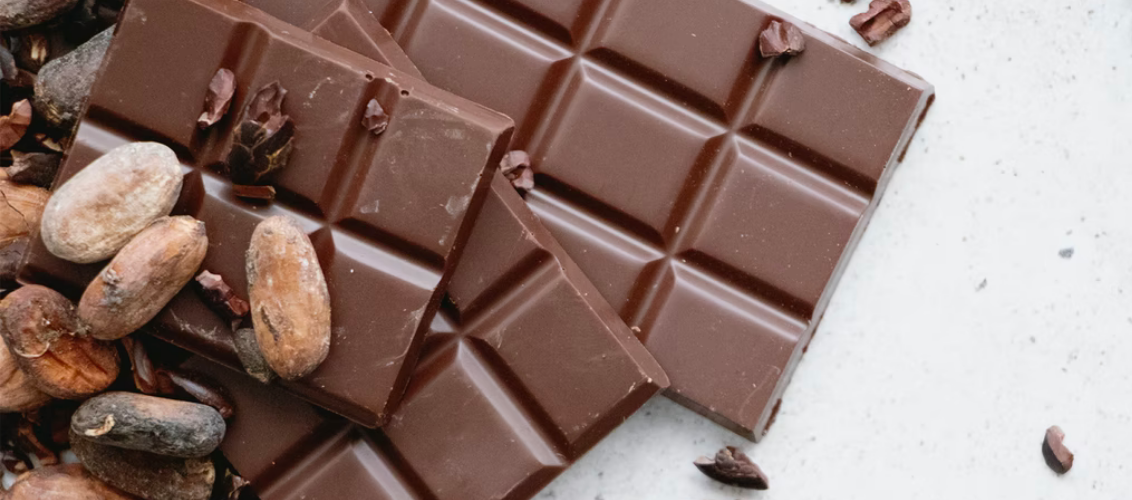
Benefits of Cocoa Super-Plant
What is Cocoa?
Cocoa, also known as cacao or cacao bean, is the dried and fermented seed of theobroma cacao from which cocoa solids and cocoa butter is extracted. The cocoa plant originates from Mexico; it has three main varieties: Trinitario, Criollo, and Forastero. Cocoa contains several compounds that are beneficial to man's health.
Uses of Cocoa
1. Cocoa is used in manufacturing beverages and chocolate liquors.
2. Cocoa pods are used for making soaps.
3. Cocoa powder is used in various dishes, especially cakes, brownies, cookies, etc.
4. The blends of cocoa powders and chocolate liquors are used as a flavor in food products.
Traditional benefits of Cocoa
Cocoa is used traditionally for treating fever, improving heart strength, increasing appetite, and treating kidney disorders. Cocoa leaves are used in treating skin problems such as burns and stomach complaints.
Surprising facts about Cocoa
Cocoa is an essential ingredient in manufacturing chocolate and chocolate confectioneries.
According to the World Cocoa Foundation, more than 3 million tons of cocoa are consumed in a year.
The cocoa tree is one of the best antioxidants on the planet and manufactures dark chocolate. Studies show that dark chocolate can boost health and lower heart diseases by improving blood flow and lowering blood pressure.
Cocoa can help to enhance cognitive function in older people with mental impairment and enhance verbal fluency.
Cocoa was once used as a currency.
Health benefits of Cocoa and why myAir bars contain it
1. Cocoa is rich in polyphenols
Polyphenols are antioxidants that occur naturally in fruits, tea, vegetables, wine, and chocolate. Polyphenols have numerous health benefits such as reducing inflammation, enhancing blood flow, improving cholesterol, lowering blood pressure and blood sugar levels.
Cocoa is very high in polyphenols, especially flavanols which have potent anti-inflammatory and antioxidant properties. However, cocoa loses more of its beneficial properties when heated, processed, or treated with alkaline.
Cocoa is rich in polyphenols which can help to reduce inflammation and improve cholesterol levels in the body.
2. Cocoa can aid in controlling weight
Consuming cocoa can help to control weight. Cocoa can help regulate energy use by reducing appetite and inflammation, thereby increasing fullness and fat oxidation.
A population study found that people who took chocolate more often experienced more BMI than people who took it less often.
Additionally, a weight-loss study using low-carbohydrate diets showed that those given 42 grams or about 1.5 ounces of 81% cocoa chocolate daily experienced weight loss than the regular diet groups. However, plenty of other studies found that consuming chocolate increases weight, although no specification was made about the chocolate.
The addition of cocoa into your diet may aid in achieving faster weight loss.
3. Cocoa can help to lower high blood pressure in the body
Cocoa, either in the form of dark chocolate or powder, can help to reduce blood pressure.
This reduction ability was first noted in island people of Central America when they consumed cocoa; they experienced a reduction in their blood pressure than those that did not drink cocoa.
Cocoa contains flavanols that help enhance nitric oxide levels in the blood, thereby enhancing the function of blood vessels and reducing blood pressure.
A review of 35 experiments analyzed patients given 1.4-105 grams of cocoa products or about 30-1218mg of flavanols. The results show that cocoa produced a small but significant decrease of 2 mmHg in blood pressure.
Additionally, the effect of cocoa was more significant in people with high blood pressure and older people, than with normal blood pressure and younger people, respectively.
Studies show that the presence of flavanols in cocoa helps to lower blood pressure through the improvement of nitric acid levels and blood vessel function.
4. Cocoa can help to improve mental health and brain function
In a 2-week study of 34 older adults given cocoa with high flavanols, the result shows an increase in blood flow to the brain by 8% after one week and 10% after two weeks.
Furthermore, some studies suggest that daily consumption of cocoa flavanols can boost mental health in people, whether they are mentally impaired or not. Cocoa had a very positive effect on brain functioning and neurodegenerative diseases such as Parkinson's and Alzheimer's.
Cocoa contains flavanols that support neuron production, improve blood flow, supply blood to brain tissue, and enhance brain functioning. Flavanols also help in preventing degenerative brain diseases such as Alzheimer's disease.
5. Cocoa can help to reduce the risk of stroke and heart attack
Cocoa contains properties that can help to reduce the risk of having a stroke or heart attack. The presence of flavanols in cocoa enhances the nitric oxide levels in the blood, thereby relaxing and dilating the arteries and blood vessels and enhancing blood flow in the body.
Cocoa can also help to lower "bad" LDL cholesterol. Cocoa can work as aspirin in thinning the blood, thereby improving blood sugars and reducing inflammation. These effects have been linked to a lesser risk of heart attack, stroke, and heart failure.
A review of human studies in 157,809 people suggests that higher consumption of chocolate led to a significant reduction in the risk of heart disease, stroke, and even death.
Two Swedish studies found that the consumption of chocolate daily can lead to a reduced rate of heart failure. The results suggest that frequent consumption of a small amount of chocolate rich in cocoa is beneficial to the heart.
Cocoa can help to improve blood flow and reduce cholesterol in the body. Consuming a serving of chocolate can also help reduce the risk of stroke, heart failure, and heart attack.
6. Cocoa contains polyphenols that enhance blood flow and brain function
Several studies found that the presence of polyphenols in cocoa can help to lower the risk of neurodegenerative diseases by improving blood flow and brain function.
Flavanols can cross the blood-brain barrier and be involved in the biochemical pathways which are important neurons and molecules necessary for brain functioning.
Furthermore, flavanols also influence the production of nitric oxide, which helps relax the muscles of the blood vessels, thereby improving blood flow and blood supply to the brain.
The presence of polyphenols and flavanols in cocoa can help to enhance blood flow and blood supply to the brain, thereby improving brain functioning.
7. Cocoa can help to improve mood and depression symptoms
Apart from cocoa's positive effects on neurodegenerative diseases, it also helps to improve mood and symptoms of depression. The presence of flavanols in cocoa helps convert tryptophan to the natural mood stabilizer serotonin, positively affecting mood.
A study on chocolate consumption and stress levels in some pregnant women found that frequent consumption of chocolate aided in reducing stress and improved mood in babies.
A study of cocoa drinks suggests that drinking cocoa high in polyphenol can enhance contentment and calmness. Additionally, another study of some senior men showed that eating chocolate could help improve overall health and enhance better psychological well-being.
Consuming cocoa can positively affect mood and symptoms of depression, thereby lowering stress levels, enhancing contentment, calmness, and overall psychological well-being in man.
8. Flavanols can aid to improve symptoms of Type 2 diabetes
Although overconsumption of chocolate is not beneficial in blood sugar control, cocoa has some anti-diabetic effects that can aid in blood sugar control.
Test-tube studies suggest that cocoa flavanols can slow down the rate of carbohydrate digestion and absorption in the gut, reduce inflammation, secrete insulin, and boost the uptake of sugar out of the blood into the muscles.
Some studies show that higher consumption of flavanols from cocoa can help lower the risk of type 2 diabetes. Additionally, a review of human studies shows that consuming dark chocolate rich in flavanol can enhance blood sugar control, improve insulin sensitivity and reduce inflammation in diabetic and non-diabetic people.
These studies' results combined with more positive effects on heart health suggest that cocoa polyphenols and flavanols can positively control and prevent diabetes in the body.
Consuming cocoa and dark chocolate can help lower the risk of diabetes and maintain healthy blood sugar levels.
Conclusion
Cocoa contains some compounds that possess many promising benefits, such as controlling blood sugar, enhancing brain and memory function, improving symptoms of type 2 diabetes, etc. However, more research is needed to determine the full benefits of cocoa to man's health. Good news - some myAir bars are packed with Cocoa!
Footnotes
Cocoa, Blood Pressure, and Vascular Function
Valeria Ludovici et al. Front Nutr. 2017.
https://pubmed.ncbi.nlm.nih.gov/28824916/
Effect of cocoa on blood pressure
Karin Ried et al. Cochrane Database Syst Rev. 2017.
https://pubmed.ncbi.nlm.nih.gov/28439881/
Cocoa, Blood Pressure, and Vascular Function
Valeria Ludovici et al. Front Nutr. 2017
https://pubmed.ncbi.nlm.nih.gov/28824916/
Cocoa and Human Health: From Head to Foot--A Review
Quintino Reis De Araujo et al. Crit Rev Food Sci Nutr. 2016.
https://pubmed.ncbi.nlm.nih.gov/24915376/
Habitual chocolate consumption and risk of cardiovascular disease among healthy men and women
Chun Shing Kwok et al. Heart. 2015 Aug.
https://pubmed.ncbi.nlm.nih.gov/26076934/
Chocolate intake and incidence of heart failure: a population-based prospective study of middle-aged and elderly women
Elizabeth Mostofsky et al. Circ Heart Fail. 2010 Sep.
https://pubmed.ncbi.nlm.nih.gov/20713904/
Chocolate and the brain: neurobiological impact of cocoa flavanols on cognition and behavior
Alexander N Sokolov et al. Neurosci Biobehav Rev. 2013 Dec.
https://pubmed.ncbi.nlm.nih.gov/23810791/
Cerebral blood flow response to flavanol-rich cocoa in healthy elderly humans
Farzaneh A Sorond, Lewis A Lipsitz, [...], and Naomi DL Fisher
https://www.ncbi.nlm.nih.gov/pmc/articles/PMC2518374/
Sweet babies: chocolate consumption during pregnancy and infant temperament at six months
Katri Räikkönen et al. Early Hum Dev. 2004 Feb.
https://pubmed.ncbi.nlm.nih.gov/14757265/
Chocolate, well-being, and health among elderly men
T E Strandberg et al. Eur J Clin Nutr. 2008 Feb.
https://pubmed.ncbi.nlm.nih.gov/17327862/
Effects of Cocoa Antioxidants in Type 2 Diabetes Mellitus
Sonia Ramos et al. Antioxidants (Basel). 2017.
https://pubmed.ncbi.nlm.nih.gov/29088075/
Molecular mechanisms underlying the potential antiobesity-related diseases effect of cocoa polyphenols
Faisal Ali et al. Mol Nutr Food Res. 2014 Jan
https://pubmed.ncbi.nlm.nih.gov/24259381/
Association Between More Frequent Chocolate Consumption and Lower Body Mass Index
Beatrice A. Golomb, MD, PhD, Sabrina Koperski, BS, and Halbert L. White, PhD
https://www.ncbi.nlm.nih.gov/pmc/articles/PMC4285439/
Chocolate with high Cocoa content as a weight-loss accelerator
December 2015International Archives of Medicine 8(1)
DOI:10.3823/1654
Habitual chocolate consumption may increase body weight in a dose-response manner
James A Greenberg et al. PLoS One. 2013.
https://pubmed.ncbi.nlm.nih.gov/23950919/
Potential for preventive effects of cocoa and cocoa polyphenols in cancer
Maria Angeles Martin et al. Food Chem Toxicol. 2013 Jun.
https://pubmed.ncbi.nlm.nih.gov/23439478/
Does Flavanol Intake Influence Mortality from Nitric Oxide-Dependent Processes? Ischemic Heart Disease, Stroke, Diabetes Mellitus, and Cancer in Panama
Vicente Bayard, Fermina Chamorro, [...], and Norman K. Hollenberg
https://www.ncbi.nlm.nih.gov/pmc/articles/PMC1796954/
Cancer protective properties of cocoa: a review of the epidemiologic evidence
Gertraud Maskarinec. Nutr Cancer. 2009.
https://pubmed.ncbi.nlm.nih.gov/19838930/
Unsweetened natural cocoa has anti-asthmatic potential
C Awortwe et al. Int J Immunopathol Pharmacol. Apr-Jun 2014.
https://pubmed.ncbi.nlm.nih.gov/25004832/
Long-term ingestion of high flavanol cocoa provides photoprotection against UV-induced erythema and improves skin condition in women
Ulrike Heinrich et al. J Nutr. 2006 Jun
